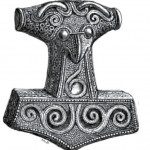As I have struggled to gain wellness again and a foothold back in a land filled with those who are well, I have watched a lot of television. I like Discovery and the NatGeo channel best.
Last night, unable to sleep, I fell into watching Polygamy, USA.[i] In the early morning hours, my husband priest convinced me to try to sleep, and I dreamed of Christianity. In fact, as I woke with an ache in my heart, I was forced to face the fact that I missed two things from Christianity – the singing and the consistency.
There is so much more that I do not miss. For me, however, Family Coven has arisen out of the thing I miss the most.
In the final episode, a young girl is given the Thirteen Articles of Faith for The Church of Latter Day Saints [ii] to memorize after she professes her desire to be baptized. This sect of Mormonism believes in full immersion baptism, which necessitates a specific baptismal dress. The child’s mother begins to describe her memories as a child around the same baptismal font, with her mother greeting her after being bathed in the Holy Spirit. I turned off the television after the woman speaks fondly of being surrounded by those who loved her and how she felt bound to recreate the same comfort for her daughter.
I remember my baptismal font in an evangelical independent southern Baptist church that no longer exists, a place my own child has never even been to and that I would never want to return to. For me, Christianity was about constant pain and complicity in violation. Not all consistency is a good thing.
Yet Paganism lacks the good things about tradition and consistency. Having walked away from Christianity because my personal articles of faith were no longer congruent with the general articles of belief held by churches, I had also walked away from my legacy – the legacy of faith my extended family had begun and my family of origin had tried to keep – that legacy of both good and bad consistency.
In my violence- and violation-filled youth, church and church camps were the only constant in my life. I could count on being in Sunday school and then the main service on Sundays. On Wednesdays, I could count on having dinner at the church, then attending a less formal praise and worship service. When I visited my grandparents, church was part of their weekly routine on Sundays, Wednesday, and Thursdays (when they would travel around the county visiting the sick and infirmed). I was shipped off to a summer camp that insisted on a church service morning, noon and night – in reflection of the Old Testament Daniel praying to be delivered from the heathens who worshiped Baal [iii] and didn’t respect Daniel’s idea of a single God.
As someone who has suffered various periods of illness, I find consistency difficult. Let’s face it, the pagan community at large makes consistency difficult. I know of one group that has held classes for 22 years without missing one, and they are located in Canada. Needless to say, the commute is not possible for me. If I lived in Canada, you better believe my Family Coven would be on that with all the zeal of an evangelical preacher.
I gave up hoping that some consistency could be found in the pagan community a long time ago. Witch wars and political intrigue and power-hungry sanctimonious elders keep our larger pagan community in flux. There is no Ship of Zion piloted by the strong, benevolent god figure for pagans to seek refuge in, count on, depend on. [iv] It is the weakness inherent in a young religion.
This is why Family Coven is important to me. Ideally, a Family Coven is made up of more than one motivated human who will cause Full Moon rituals to occur no matter what else is going on. Family Coven attempts to build up resources that will help spiritual practice happen on a regular basis. Family Coven should track and create legacy, create mothers who say of their daughters’ coming of age, “I remember when I came of age, and I wanted to pass along that stable influence to my children. It is my duty as a mother priestess.”
When I am laid up, I also fall into reading fiction a great deal. My current reading list includes the new Laurell K. Hamilton book, A Shiver of Light, A Meredith Gentry Novel.[v] Hamilton came out as polyamorous and pagan last year on her Facebook blog. Many who have read her novels suspected as much long before her public announcement.
In her book, I have found camaraderie in fictional places and people. This camaraderie is what I miss as well. Our mythos cannot be found in one location, the way Christianity finds its mythos in the Bible. As we create our mythos, words of wisdom come to us from various places, including fiction being created today. Let us not discount our modern Bards like Arthur Hinds [vi], whose poetic works bring us new narratives based upon old histories. Just being around those of like mind, lifting each other up, loving each other in the light of a common belief, is hard to find in the pagan community. Reading Hamilton is like applying a salve to my tired soul.
I smelled roses and I knew the Goddess was with me, and then I felt/saw/knew that she would be standing over us. To me she was a cloaked figure, because Goddess comes to us all in different ways, or all ways.
If you are following Deity’s plan for you, it isn’t always the easy path; sometimes it’s the hard one. So why follow? Because to do any less is to betray your own abilities and gifts, and the faith that Deity has in you. Who would do that willingly?
There is power and magic in love, all kinds of love.
I breathed deeply, forcing myself to take even breaths, and then I let is out slow, counting as I did so. Control your breathing and you control nearly everything else, but first gain control of yourself; always begin there. Those had been my father’s words to me. That helped calm me down, too.
“And the magic is like most of our powers, like nature itself; the storm does not mean to tear down your house, but it still might.”
It is these words that I read when I cannot sleep or am in pain: these tenuous connections to the belief system I have chosen.
What I haven’t quite gotten a handle on is how to create consistency around me. There are like-minded practitioners all around me and yet, if I do not step up and jump start activity around me, it usually doesn’t happen. My hope for Family Coven is to empower anyone to initiate activity. Do not wait on the most spiritually inclined among you. If the driving force in your community is ill or otherwise unable to lead, then those who are able-bodied must step up and plan and host. Our empowerment is for all practitioners, not one pastor or priest or group of elders. Christianity suggests only certain people (mainly men) can lead. Paganism is counter to Christianity in every way when it comes to empowerment. All pagans are empowered, and all pagans are needed to own the power they have.
In Christianity, scores of people behind the scenes insure that if you show up on Sunday morning or evening, Wednesday night or Thursday night, there will be something happening. You just have to show up. Paganism is not a passive participation culture. We are an active participation culture. If you are part of a larger community and are irritated that Full Moons and classes aren’t happening, then step up and lead. Consistency in Paganism isn’t created by passing the plate and creating an infrastructure of people paid to get things done. It is reliant upon the consistency of those who want to worship.
Do not be lazy. It is so much easier to watch reality television than to actually participate in the world around you. My husband priest said once, “I always bitch about having full moon or Sabbat at our house, and then afterwards I am calm and restored and feel stupid that I was bitching.”
For consistency, we must press through our own mental road blocks and help others find a way to do the same.
No boat will sail into view for us to hop on. That is a strictly Christian view of interaction with the Divine. Our gods and goddesses want us to come to them. Set aside the static of everyday life and move toward worship regardless of the swirling storms around. Christ walks on water for his disciples. Our Deities ask us to take the first step and make our investment. They want us to walk toward them. Only the self-empowerment to create sacred space consistently will create a stable spiritual environment for our children and ourselves. Christians wait upon the Lord. Pagans go to the Lord and Lady in supplication and then help to row the spiritual ship where they direct.
[i] “The Baptism.” Polygamy, USA. National Geographic. NatGeo, Atlanta. 13 June 2014. Television.
[ii] The Church of Jesus Christ of Latter Day Saints (LDS). “Articles of Faith Thirteen basic points of belief to which Mormons subscribe.” http://www.mormon.org/beliefs/articles-of-faith (accessed June 13, 2014).
[iii] Patty Loveless. “Daniel Prayed.” Ralph Stanley. Lyrics Shelby Singleton Sheet Music Inc. (accessed June 13, 2014)
[iv] The Kingsmen. “Old Ship of Zion.” Kingsmen, Chattanooga Live. Conrad Cook, 1977. Kingsmen Publishing Company.
[v] Hamilton, Laurell K. Accessed by Kindle Fire, 1st Gen. In A Shiver of Light: A Meredith Gentry Novel. New York: Berkley Books, 2004.
[vi] Author Notes; I use two of Author Hinds works in my forthcoming book; Family Coven: Birthing Hereditary Witchcraft. Immanion Press. (TBA). Those works are The Four Jacks and Pagan Girl. I am eagerly anticipating his new work which should be out soon.













